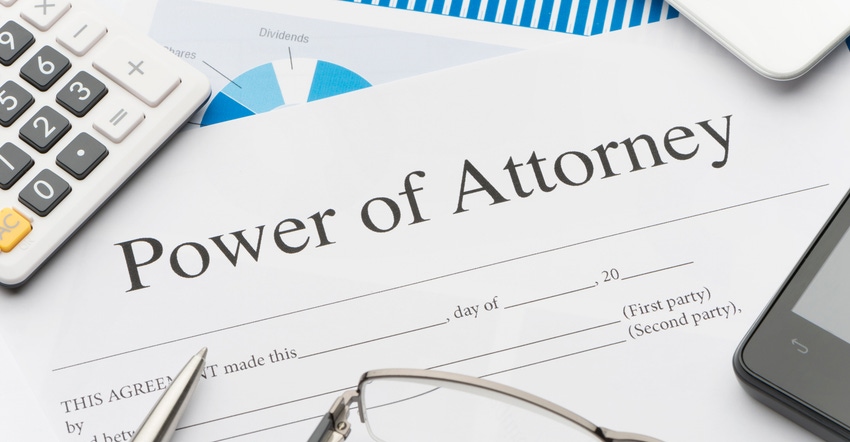April 1, 2021

Powers of attorney are very useful tools. They come in many forms and can allow busy farmers and ranchers to be in more than one place at a time. Powers of attorney can also be a critical piece of a properly designed estate plan. Understanding how they work is an important part of getting the most out of this legal concept.
Any adult with “capacity” (the ability to receive and evaluate information and to make or communicate decisions) may create and execute a power of attorney. A power of attorney generally has two parties : the principal and the agent. The principal is the person who grants the authority to another to act on their behalf. The agent is the person who is granted the authority to act on behalf of the principal.
The authority that you give your agent may be very limited or very broad, and can even be put in place for a single transaction. A financial power of attorney and a health care power of attorney are often two separate documents, but they can be combined into one. The power of attorney can take effect immediately, at a later date, or upon some event in the future, such as your incapacity. You may set a date in the future that your agent’s authority ends, or it can remain in force until revoked in writing. There can be more than one principal and more than one agent in the same power of attorney. You may name any adult you choose as your agent, including family members, friends and professional advisers. However, stockbrokers and financial advisers are generally prohibited from serving as an agent on behalf of a client.
A capacity for abuse
When you execute a power of attorney, you are granting the agent the power to act on your behalf as described in the document. Because they can act on your behalf, and in your name, you should make sure the agent you choose is someone you can trust. Sadly, the authority granted under powers of attorney is frequently abused — particularly after the principal becomes incapacitated.
As a result, you should consider using more than one agent. Naming co-agents who must act together provides you additional protection and is recommended when a power of attorney is going to be effective after your incapacity. Every principal who had an agent misappropriate funds believed they could trust the individual when they signed the power of attorney.
Because of the significant abuse by agents, many states have recently enacted additional requirements related to how you grant power to the agent. These powers must be specifically or expressly granted. They will not be included under a general grant of power.
An example of specific or express powers is the ability to make gifts or change survivorship or beneficiary designations. Before creating a power of attorney that you would like to continue upon your incapacity, you should clearly understand your state’s specific or express powers, and then include or exclude them to meet your needs.
Others, such as banks, doctors and government clerks, will be asked to rely on the document and act at the direction of your agent. Therefore, it is very important for you execute a document that clearly reflects your intentions and sets out the duration of time during which your agent may or may not act.
A useful tool
A valid, thorough power of attorney can be a good tool to avoid court involvement in your affairs if you are ever mentally incapacitated. If a valid power of attorney is not in place and/or it does not grant the power to conduct the business needed, your caregivers must ask the probate court to appoint a guardian and/or conservator to act on your behalf, an expensive and time-consuming process.
Powers of attorney can be an effective tool to delegate responsibility for tasks to others when you need to be in more than one place at a time, and they are an important part of an effective estate plan. They also grant a great deal of your personal rights and powers to another person, so choose your agents wisely and draft the language of the power of attorney carefully.
Dolan, an attorney, helps farm and ranch families achieve comprehensive estate, succession, and legacy planning objectives. He is the principal of Dolan & Associates P.C. in Brighton and Westminster, Colo. Learn more on his website, estateplansthatwork.com.
About the Author(s)
You May Also Like






